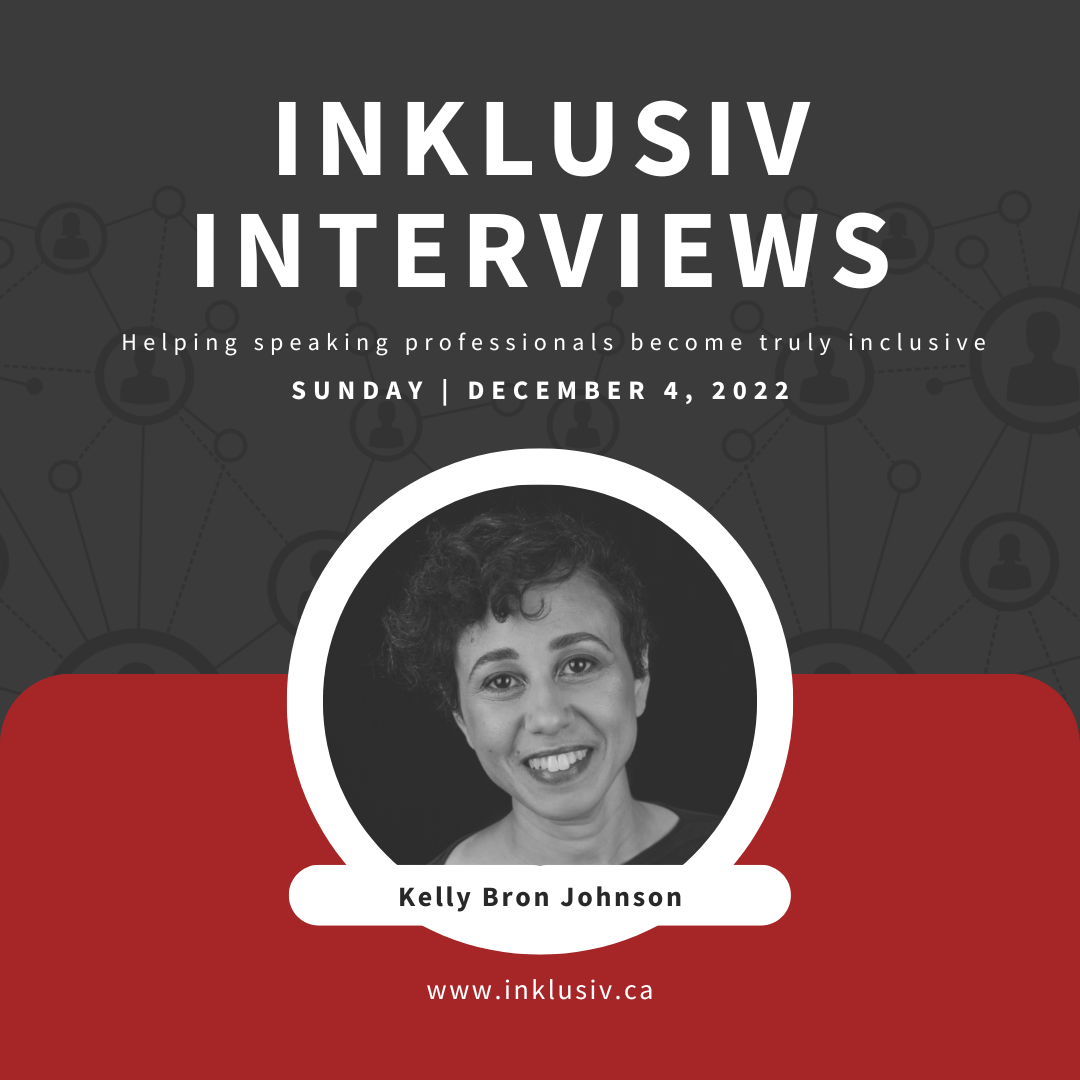Interview with Kelly Bron Johnson

Every week, we meet with audience members with disabilities who are willing to come forward and share a little bit about their own personal journey and experiences, attending live, in-person, or virtual speaking or training events. Through their unique and generous perspectives, speakers, trainers, facilitators, and other communication professionals can hopefully learn about some of the things that they do well, but also (and maybe more importantly) about some of the things they could improve to provide an experience that is truly inclusive of everyone.
Meet Kelly, an audience member who is autistic, has dysthymia and is hard of hearing
So, without further ado, let’s dive right into this week’s interview with Kelly Bron Johnson (she/they/lel). Kelly is autistic, has dysthymia, and is hard of hearing. She comes to us from Quebec, Canada.
Introductions
QUESTION 01 Can you tell us a bit about yourself, and how your disability might impact your experience, as someone who attends live in-person and virtual events?
I’m a late/adult-diagnosed autistic with a high-IQ. I also have dysthymia and recently became Hard-of-Hearing in the last few years. I am mixed-heritage Black, and non-binary. So, I live with many interesting intersecting identities that colour how I am perceived and how I move about and perceive the world.
Things that ruin the experience
QUESTION 02 Thinking back on some of your experiences attending in-person or virtual events, what are some of the worst things speakers, trainers, and other communication experts can do to ruin your experience as an attendee?
Using outdated or exclusionary language (“hey guys!”), or euphemisms like “special needs” or “differently-abled.” Not having captions or translation available. Not having sign language interpretation. Trying to force interaction or audience participation. Not allowing for video off. Not allowing for stimming or movement from the audience (knitting, colouring, doodling, fidgeting people are still actively listening).
Things that make a positive impact
QUESTION 03 Can you share some of the great things speakers, trainers, and other communication experts sometimes do that make a positive impact on your ability to fully enjoy your in-person or virtual event experiences?
Speaking from lived experience and not trying to be an expert in all things – especially using only what they’ve learned in a book or by association with certain people. I’m not interested in hearing from people who simply read about my experience in books – even if they have a degree in it. I want people with lived experience to take up the most space. Allies can amplify voices, but not replace us.
Sharing a piece of advice
QUESTION 04 If you had one piece of advice to give speakers, trainers, and other communication experts, so their content became more inclusive of people who have disabilities, what would it be?
Be authentic and try to make your work as accessible to all as possible. If you are not disabled yourself or lacking a certain perspective, invite those with lived experience to speak with you. Or give the gig to them. And pay them if you use their work or invite them to talk.
Wrapping up
QUESTION 05 Thank you for sharing some of your insights with us today. As we wrap up our conversation, is there anything that you’d like to add, such as another thought, another piece of advice, another perspective, etc.?
Value our labour. Value those who paved the way for us. There are so many ground breakers that helped create the spaces where I can now speak freely about my experiences and who I am, completely. It wasn’t always safe for us, and we weren’t always welcome. We’re still underestimated and undervalued as a group.
Connect with our guest on social
Interested in knowing more about our guest this week? You can follow Kelly on LinkedIn.

About Denis Boudreau
Denis Boudreau is a consultant, trainer, and speaker specializing in digital accessibility and disability inclusion. He works with organizational leaders who want to equip their teams with the skills to create accessible websites and digital products – so no one is left behind. A Certified Professional in Web Accessibility (CPWA), Denis has trained thousands of web professionals over the past 20+ years and delivered hundreds of workshops in both English and French. He has helped leading brands like Netflix, Salesforce, and Victoria’s Secret embed accessibility into their digital strategies, empowering them to meet legal obligations, improve user experience, and connect with more people, more effectively.
